Murad Baksh is facing terrorism charges for vandalizing Bahria Town Karachi property – even though he wasn’t present at the protest site when violence erupted on June 6.
“I was unwell that day and had gone to the doctor’s. Regardless of my absence [on June 6], a First Investigation Report (FIR) was launched against me. I got interim bail and despite that the police raided my house and picked [up] two of my cousins,” recounted a frustrated Baksh.
Baksh is a resident of Noor Muhammad Goth, where his family has lived since before Pakistan’s independence. Baksh and his father have been resisting the acquisition of their lands by Bahria Town Karachi, a development project undertaken by a real estate company that caters to Pakistan’s elite.
This isn’t the first time Baksh has had a FIR launched against him by Bahria Town Karachi. His father was jailed in 2015 and recently Baksh and his brother were beaten and locked up for resisting the evictions by Bahria Town in April.
“We haven’t heard of such injustice before, taking someone’s land and house. Bahria Town and the Karachi police are both mobsters,” said Baksh.
What Happened on June 6?
On June 6, the Sindh Action Committee (SAC), an alliance of several nationalist and political parties, called for a protest against the eviction of villagers from their ancestral homes by Bahria Town Karachi. News of the protest spread across Sindh and the demonstration saw an influx of residents from several affected goths (villages), activists, nationalist parties, and common citizens, regardless of the barriers placed in their way. Roads leading to the protest site were blocked to stop many people from joining.
Many activists who attended the June 6 protests told The Diplomat that speeches by the organizing committee members were going on when all of a sudden, thick black smoke was billowing from the main gate of Bahria Town. There were several announcements from the stage requesting that protesters remain peaceful and declaring that those setting property on fire weren’t with the organizers.
The police came into action and fired teargas to disperse the crowd, which included children, women, and elderly people. Many were injured. A small number of protesters entered Bahria Town, setting fire to vehicles, showrooms, and buildings.
Grave repercussions followed the incident, as more than 28 FIRs have been launched on terrorism charges, with thousands of people booked. A crackdown against activists and nationalists has been ongoing. Many of the victims of this crackdown weren’t even present at the protest site on June 6. Since FIRs have been launched against “unidentified people,” activists say it have given a free hand to the police to arrest people who were not involved.
“Pictures of people who weren’t even present at the gate of Bahria Town have been released by Bahria Town guards. I am a victim of this myself. After that, two or three times some unidentified people have frequented my house and have investigated me,” said Mubashir, a student activist.
Hafeez Baloch, a founding member of Sindh Indigenous Rights Alliance, who was present at the protest, told The Diplomat, “Upon hearing these announcements, the police and Bahria Town security moved back. The people inciting violence got a free hand. This was all a plot to sabotage the protest and to sabotage the alliance we had with activists and human rights organizations.”
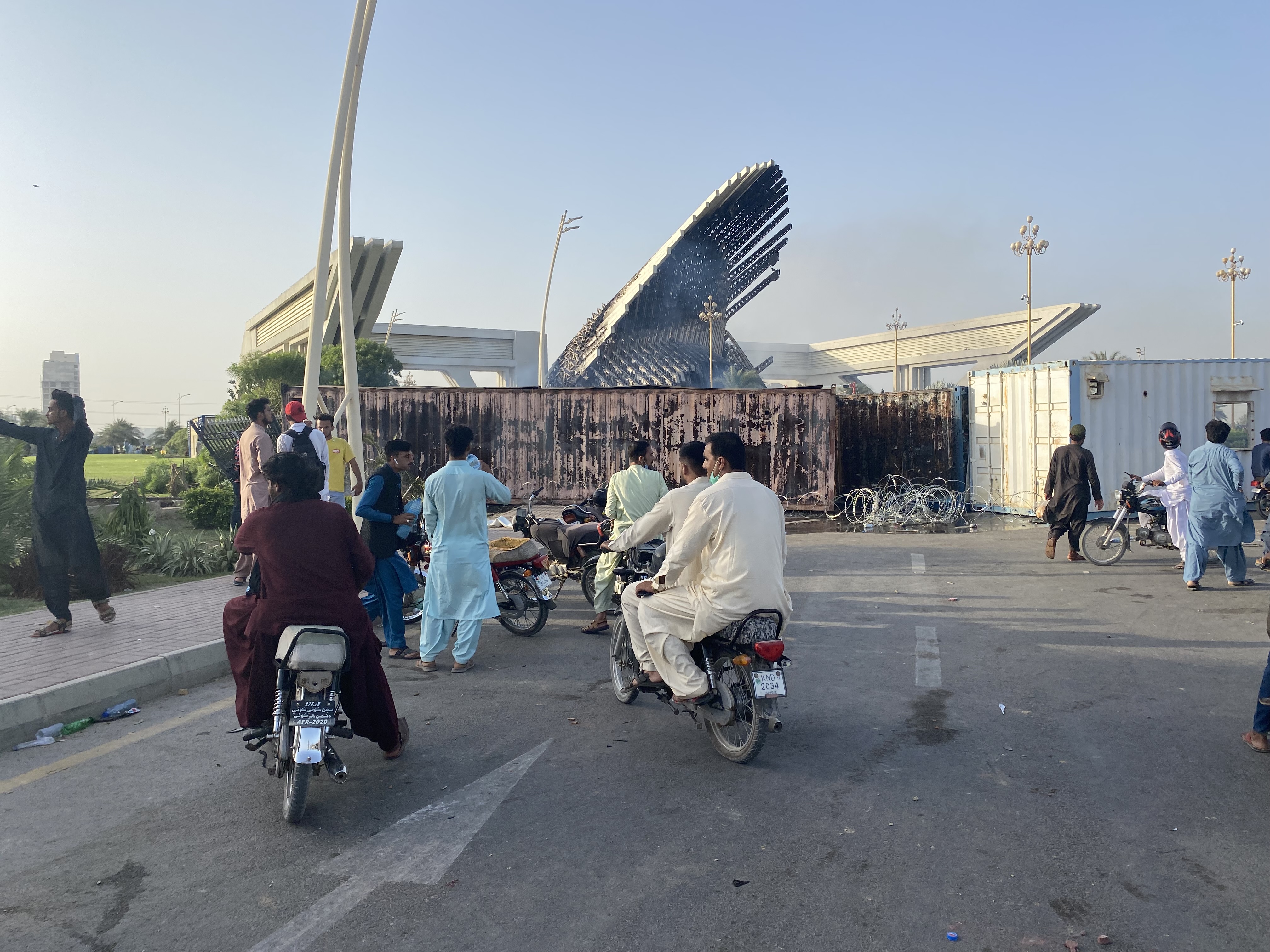
Spectators on the site of protest after the main gate of Bahria Town Karachi was set on fire. Photo by Zafar Musyani.
Malik Riaz and Bahria Town
Malik Riaz, the owner of the Bahria Town project, took to Twitter after the violence of June 6 in order to condemn it as an “act of terrorism.” Riaz stated, “We haven’t illegally occupied any land and if anyone can prove illegal occupation of even an inch of land, we are ready to face consequences and take responsibility. We have faced investigation before and we are ready to do so again.”
The activists attempting to halt the development face steep odds. Riaz, the man behind Bahria Town, is Pakistan’s most renowned business tycoon, said to have connections in the Pakistani establishment and political arena.
“A single person, on the basis of money and power, has bought all the institutions in the country from which you would expect justice. He is doing whatever he wants, taking whichever land he wants,” said Khurram Ali, the general secretary of the Awami Workers party in Karachi and a leading member of Karachi Bajao Theerek. “The police and other agencies have a role to play in this,” he added. “The policy has remained to illegally occupy lands and then strike a deal with the government to regularize them.”
Riaz’s critics say he uses force, power, and wealth to get land wherever he wants to build a Bahria Town development. But in Karachi, he has faced unprecedented resistance from indigenous communities.
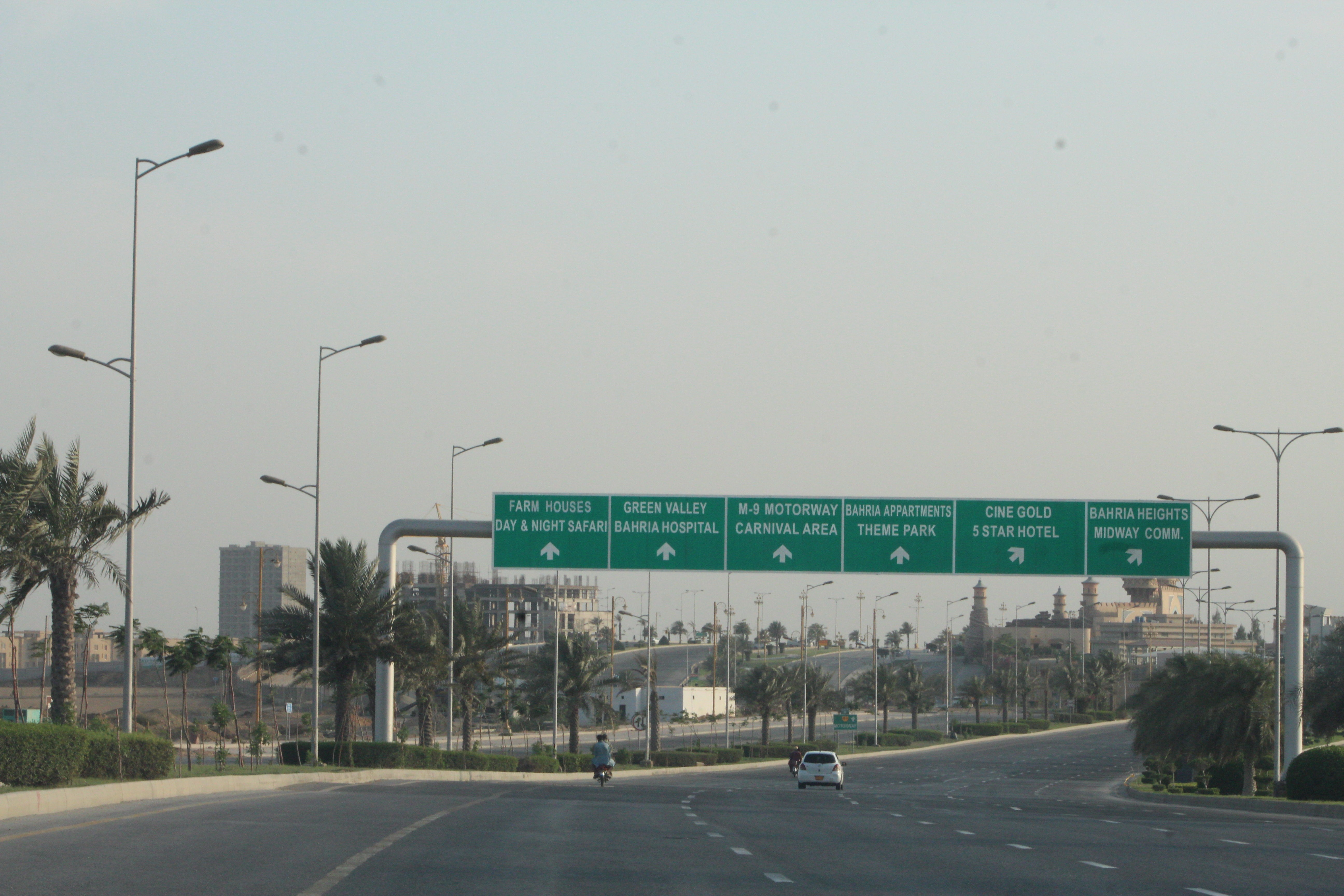
Bahria Town Karachi offers luxury apartments and many other facilities – including an amusement park, five-star hotel, and private hospital – to Pakistani elites. Photo by Zafar Musyani.
In 2018, the Supreme Court issued detailed a verdict restraining Bahria Town from undertaking any development larger than 6,000 acres. The Court said the project occupied a total of 12,156 acres. The Supreme Court observed that the Malir Development Authority (MDA), a government authority, had illegally exchanged 9,140 acres of land with Bahria Town. The Supreme Court requested the chief justice to constitute a bench for implementing the decision.
In 2019, the Bahria Town Karachi case took another turn when the Supreme Court accepted Riaz’s offer to pay compensation worth 460 billion Pakistani rupees, after which the court identified and legalized the development’s possession of 16,896 acres in Malir district.
Meanwhile, the National Crime Agency (NCA) in the United Kingdom froze more than 120 million pounds of assets belonging to Riaz in 2019, and said that the money and ownership of property in central London would be handed over to the government in Pakistan. The NCA froze eight bank accounts belonging to Riaz, suspecting that the wealth “derived from bribery and corruption overseas.” The ensuing settlement saw Riaz refuse to admit any wrongdoing while agreeing to pay 190 million pounds to the NCA. Riaz said on Twitter the money would pay to settle the Supreme Court judgment “against Bahria Town Karachi.”
“The injustice of how the NCA deal has played out, or rather been worked with the help of the Pakistani state, can’t be more apparent,” an investigative journalist who has extensively worked on the Bahria Town issue told The Diplomat. “The millions of forfeited pounds – that after forfeiture no longer belong to Malik Riaz – are going to pay for his illegal acquisition of the land where his thugs are forcibly evicting the people who have customary right over them. Doesn’t the NCA now share part of the blame for what’s happening by agreeing to [a deal] with this ruthless man?
“Did their responsibility end at forfeiture? I don’t think so.”
Bahria Town officials did not respond to requests for comment from The Diplomat.
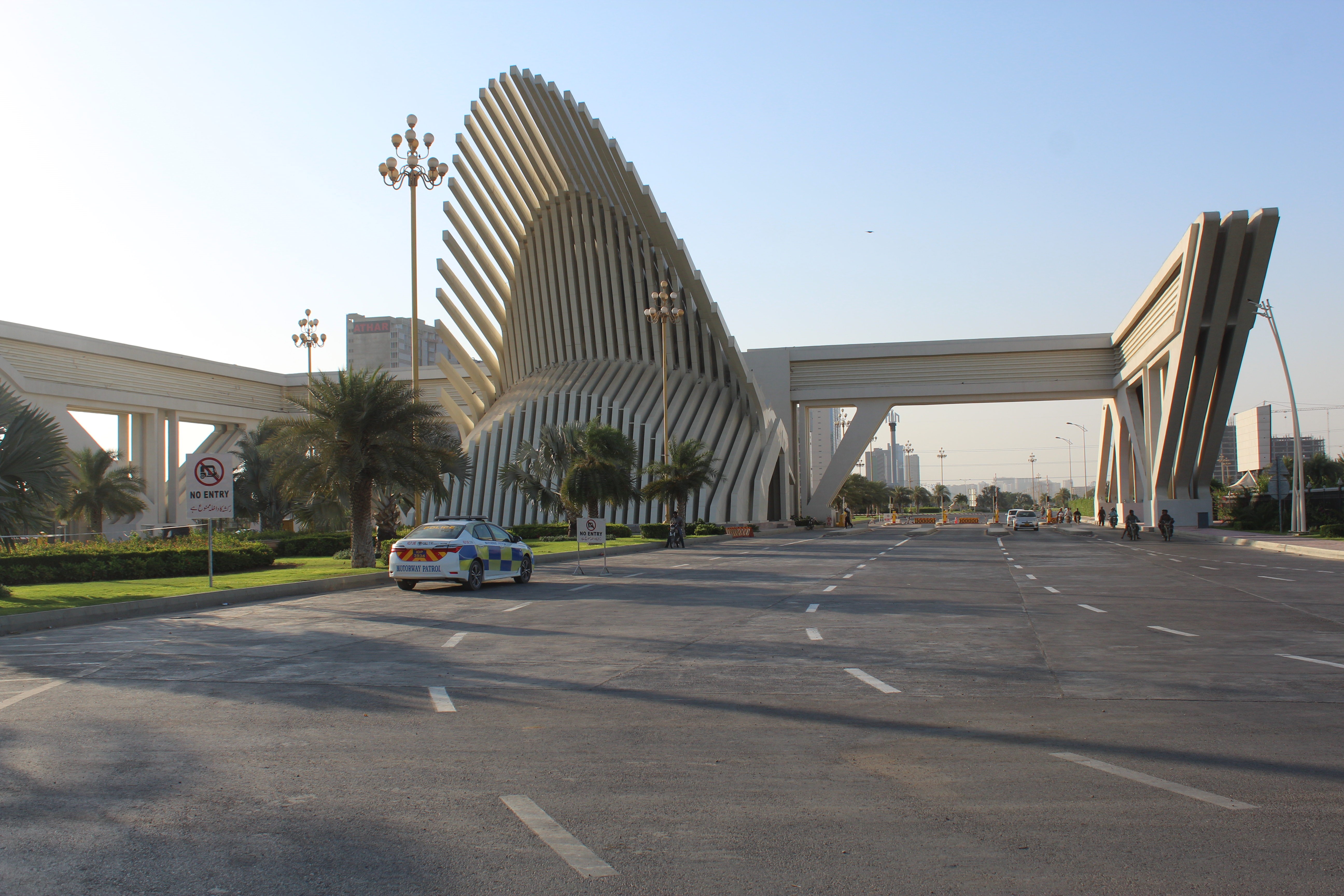
The main entry gate to Bahria Town Karachi, before it was set on fire on June 6. Photo by Zafar Musyani.
Resistance and Retaliation
Resistance to the Bahria Town Karachi project isn’t new; it dates back to 2014 when the project was launched. According to the Sindh Indigenous Rights Alliance, not more than 10 percent people living in the affected goths have sold their land.
The Sindh Indigenous Rights Alliance was created in 2015 when Bahria Town allegedly started illegally occupying the land of indigenous people. According to Baloch, “The illegal occupation started in Malir district of Karachi, but now it has reached district Jamshoro, Sindh where Bahria Town is expanding. In our understanding the Bahria Town has occupied more than 40,000 acres.”
He added, “It seems we are Palestinians and Malik Riaz and his Bahria Town are Israel and his occupying force.”
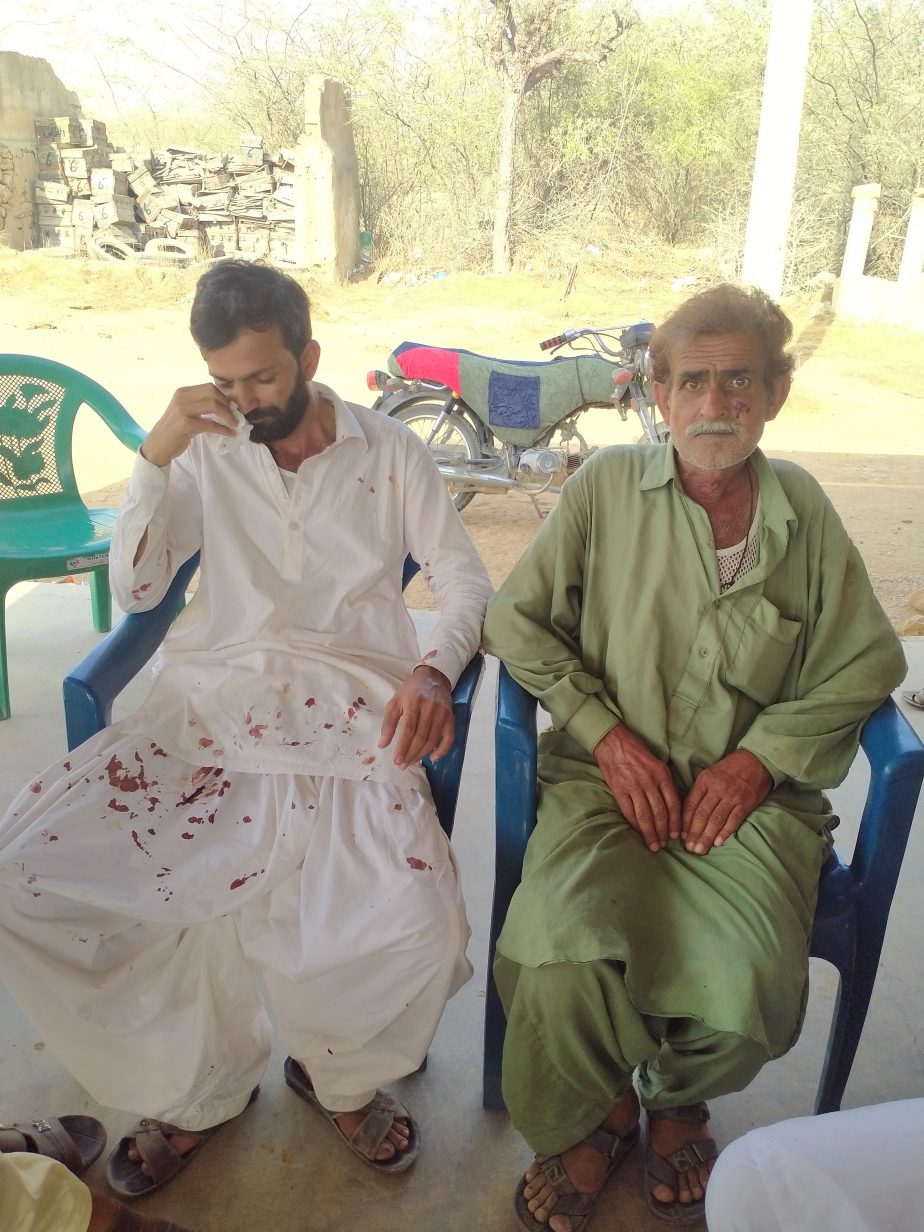
Murad Baksh (right) and Maer Gabol after they were beaten by Bahria guards and taken to the police station. Photo provided by Maer Gabol.
Faiz Muhammad Gabol, a resident of the village that bears his name, started the resistance against the powerful tycoon. Gabol was given a blank check by Riaz in 2015, but he refused to sell his land, saying the land was like his mother and that he would not accept any price for it. His eldest son Murad Baksh and younger son Maer Gabol were beaten by police when the most recent clash started.
A fresh wave of clashes began on April 28 when police and Bahria Town administration and guards, equipped with bulldozers, aimed to continue work on the project and expand it into the vicinity of villages hosting indigenous communities.
A social media campaign followed, with activists posting videos, and the hashtag #SayNoToBahriaTown trended. The Sindh police and the Pakistan People’s Party (PPP), the ruling political party in Sindh, were criticized for supporting Malik Riaz. The events pushed PPP chairman Bilawal Bhutto Zardari to take note of the matter and he directed the chief minister to take action to stop the evictions until a formal report was completed.
The information minister of Sindh, Syed Nasir Hussain of the PPP, did not respond to The Diplomat’s repeated requests for comment.
The land-grabbing mostly occurs at areas that are not regularized, which means they are not sanctioned under the Goth Abad Scheme. Without regularization, the inhabitants of these goths do not get land titles. This paves the way for their evictions and particularly land grabbing at the hand of land mafias.
The late Parween Rehman, a Karachi-based researcher and activist and the director of the Orangi Pilot Project until her murder in 2013, worked tirelessly to get these goths documented. Documentation is very important to finish the regularization process. Many of these goths are in Gadap, where Bahria Town Karachi has been built.
Rehman would often be heard saying, “Development doesn’t come from concrete! It comes from human development.”
To construct Bahria Town Karachi, heritage sites were bulldozed. Hills were ground down to meet the needs of commercialization, and the rocky and fertile landscape, with perennial streams that fall into the Malir River, has seen its topography completely reshaped.
Local historian Gul Hasan Kalmati said that the most revered poet of the Sindhi language and a Sufi mystic had stayed in this area. “The site where Bahria Town is being constructed is archeologically rich. For 500-600 years the site has continuously been used by people for residence,” Kalmati said. “There were trade routes here. Allah Muhammad Gabol area has stones with engravings from Buddha’s time period. If Bahria Town continues its expansion, these too would be damaged. This development is anti-human.”
Kalmati was present for the June 6 protest and was booked, along with many other leaders and activists, under terrorism charges. He is currently on bail and waiting for the next hearing of Anti-Terrorism Court to be held on July 15.
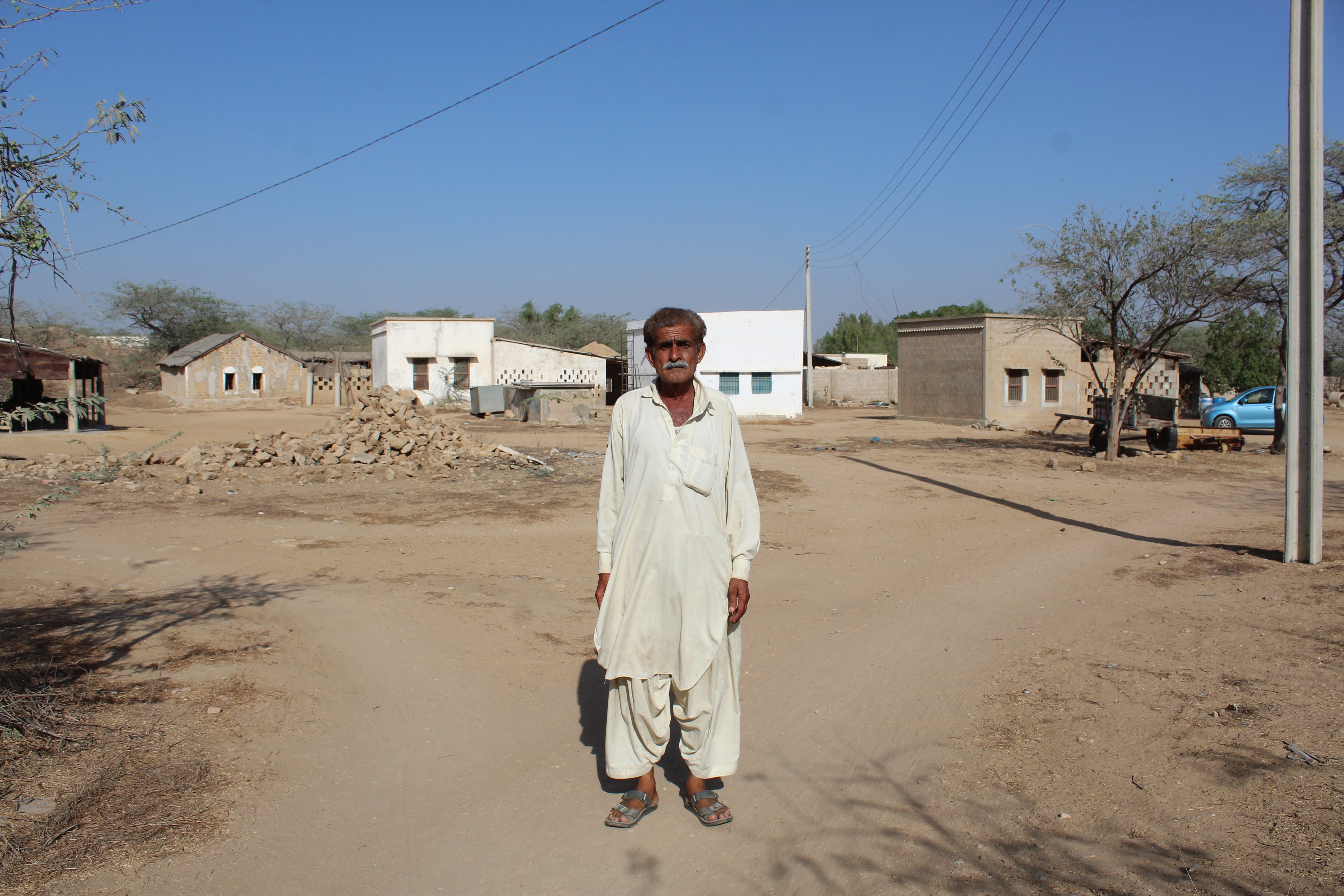
Murad Baksh standing in front of his home, in a village adjacent to Bahria Town Karachi. Photo by Zafar Musyani.
According to human rights activists, political party leaders and their workers, civil society activists – all of whom have been vocal against Bahria Town Karachi and the forced acquisition of lands and evictions – there is a crackdown being done against opponent of the development. Members of the indigenous community where Bahria Town is being built are also victims of this alleged crackdown.
Meanwhile, the activists have lambasted the mainstream media for not giving coverage to the protests against Bahria Town Karachi.
Commenting on the lack of coverage on the issue by the media, Hafeez Baloch told The Diplomat, “We have approached the media a lot in these years, but except Dawn, Pakistan’s largest English-language newspaper, no media outlet has supported us. We had the option of social media left and we have used it to raise our voice.”
“The Sindh government and Malik Riaz Hussain both want us to leave our houses and pave a way for their so-called development that is not for indigenous communities but for the elite,” Murad Baksh said. “They are powerful. They can imprison us, beat us, but we won’t sell our lands.”

